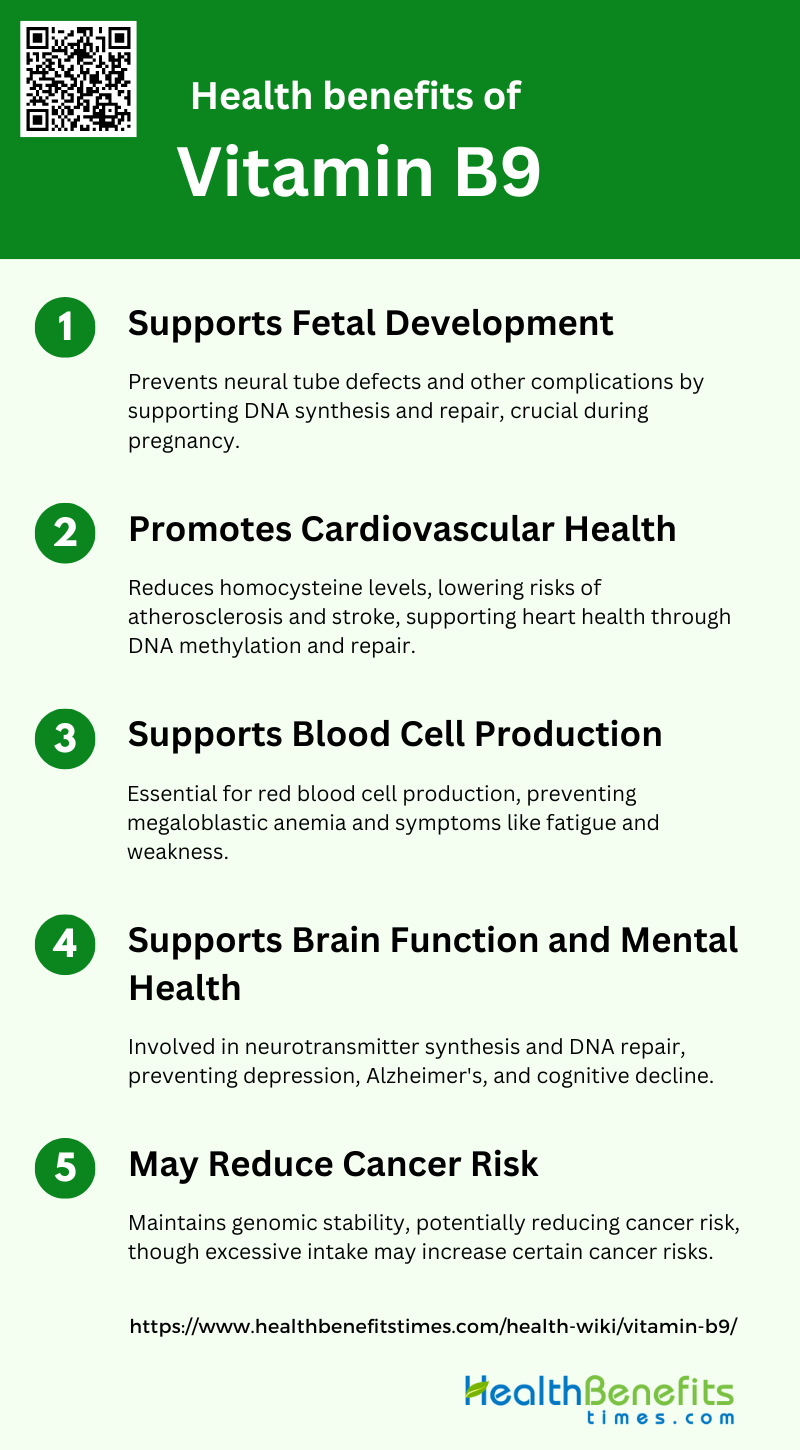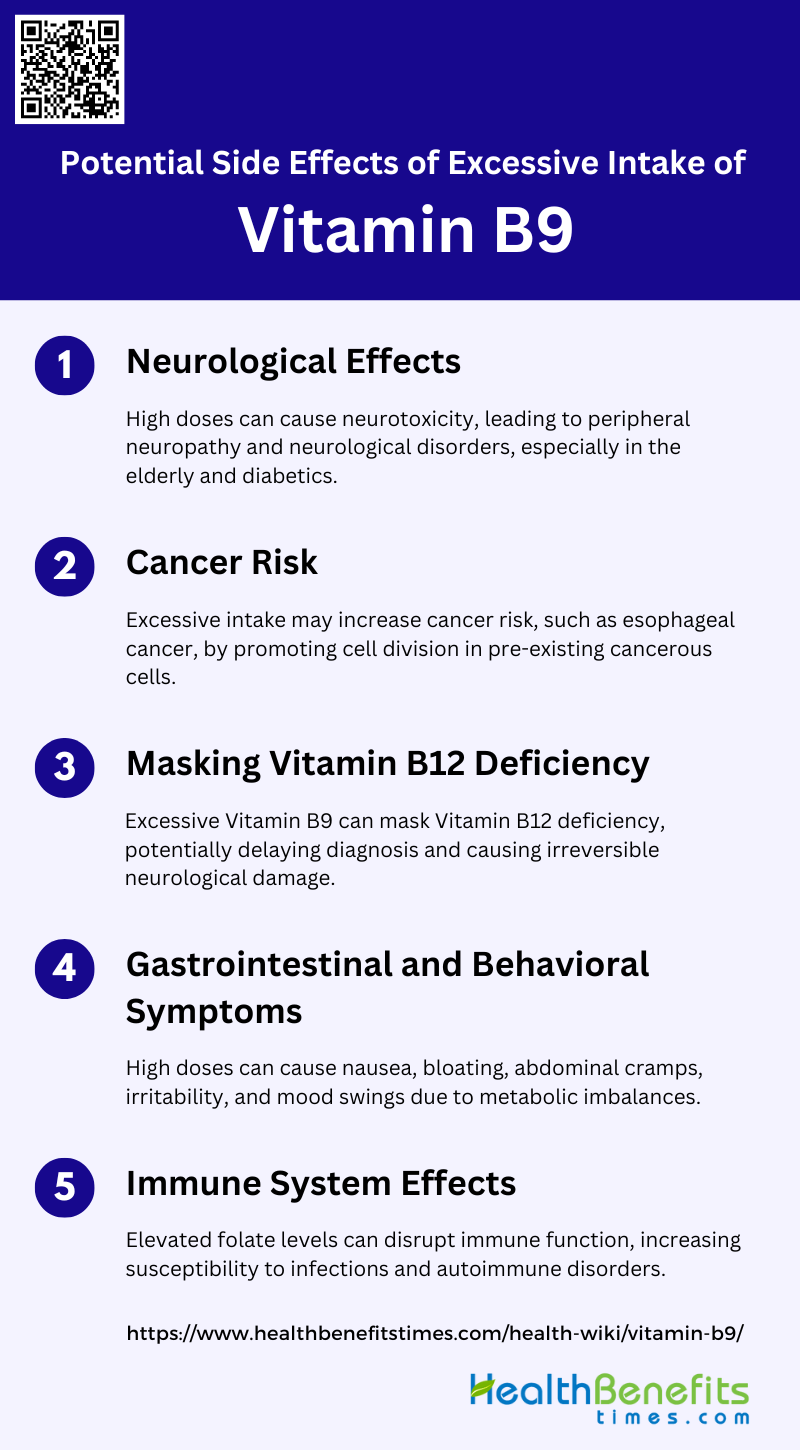Vitamin B9, also known as folate or folic acid, is a water-soluble vitamin that plays a crucial role in various bodily functions, including DNA synthesis, repair, and methylation, as well as amino acid metabolism. It is essential for the production and maintenance of new cells, making it particularly important during periods of rapid growth such as pregnancy and infancy. Folate is naturally found in many foods, including leafy green vegetables, legumes, nuts, and seeds, while folic acid is the synthetic form used in supplements and fortified foods. Adequate intake of vitamin B9 is vital for preventing neural tube defects in newborns and may also contribute to reducing the risk of certain chronic diseases, such as cardiovascular disease and certain cancers.
Chemical structure and properties of Vitamin B9
Vitamin B9 is a water-soluble vitamin that plays a crucial role in various physiological processes. Structurally, it is composed of pteroic acid and glutamic acid connected via an amide linkage. The biologically active form of Vitamin B9 is reduced tetrahydrofolates, which serve as essential cofactors in methylation reactions, including the formation of methionine from homocysteine, and as carriers of one-carbon units involved in the synthesis of purines and pyrimidines. This vitamin is vital for normal human cell division, cell growth, the formation of red blood cells, and energy production. It is also known for its role in preventing neural tube defects during pregnancy and reducing the risk of cardiovascular diseases and anemia. Vitamin B9 exhibits antioxidant properties, which can be enhanced through encapsulation techniques for better stability and bioavailability in food and nutraceutical applications. Additionally, it has been used in the development of novel compounds for musculoskeletal regeneration, demonstrating bioactivity and suitability for further in vivo studies.
Sources of Vitamin B9
Vitamin B9 is essential for various bodily functions, including DNA synthesis and repair, cell division, and growth. It is crucial for pregnant women to support fetal development and prevent birth defects. Below are the primary sources of Vitamin B9:
1. Natural Food Sources
Vitamin B9, also known as folate, is naturally found in a variety of foods, particularly in leafy green vegetables, legumes, seeds, and certain fruits. These natural sources are crucial for maintaining adequate folate levels in the body, which is essential for proper cell development and division, as well as for preventing various health issues such as megaloblastic anemia, cardiovascular diseases, and neural tube defects. Despite the availability of these natural sources, many populations still experience folate deficiency, highlighting the importance of consuming a diet rich in folate-containing foods.
2. Fortified Foods
To combat widespread folate deficiency, many countries have implemented food fortification programs, adding synthetic folic acid to staple foods such as cereals, bread, and rice. This strategy has proven effective in reducing the prevalence of folate deficiency-related conditions, including neural tube defects and certain cardiovascular diseases. Fortification ensures that even those with limited access to natural folate sources can meet their daily requirements. However, there are ongoing discussions about the potential risks associated with excessive folic acid intake, particularly its possible role in promoting the progression of precancerous lesions.
3. Supplements
Folic acid supplements are widely used to prevent and treat folate deficiency, especially in populations at higher risk, such as pregnant women and the elderly. These supplements are effective in maintaining adequate folate levels and preventing associated health issues, including developmental defects and cognitive impairments. In addition to their preventive role, folic acid supplements are also used in medical treatments, such as enhancing the efficacy of certain chemotherapeutic drugs. Despite their benefits, it is important to monitor folic acid intake to avoid potential adverse effects linked to excessive consumption.
Health benefits of Vitamin B9
Vitamin B9 is an essential nutrient that plays a crucial role in various bodily functions. It is particularly important for DNA synthesis, repair, and methylation, as well as red blood cell formation. Here are some key health benefits of Vitamin B9:
1. Supports Fetal Development
Vitamin B9, also known as folate, is crucial for fetal development, particularly in preventing neural tube defects (NTDs) such as spina bifida and anencephaly. Folate participates in one-carbon transfer reactions essential for DNA synthesis and repair, which are critical during periods of rapid cell division and growth, such as pregnancy. The fortification of food with folic acid has significantly reduced the incidence of NTDs in various populations. Additionally, folate deficiency during pregnancy can lead to other obstetrical complications, including spontaneous abortion and preterm delivery, highlighting its importance in maternal and fetal health.
2. Promotes Cardiovascular Health
Folate plays a significant role in cardiovascular health by participating in the metabolism of homocysteine, an amino acid linked to cardiovascular diseases when present in elevated levels. Adequate folate intake helps convert homocysteine into methionine, thereby reducing its concentration in the blood and lowering the risk of conditions such as atherosclerosis and stroke. Studies have shown that folate supplementation can help mitigate these risks, making it a vital nutrient for maintaining cardiovascular health. Moreover, folate’s role in DNA methylation and repair further supports its protective effects against cardiovascular diseases.
3. Supports Brain Function and Mental Health
Folate is essential for brain function and mental health, as it is involved in the synthesis of neurotransmitters and the maintenance of one-carbon metabolism, which is crucial for DNA and RNA synthesis and repair. Deficiencies in folate have been linked to neuropsychiatric disorders such as depression, Alzheimer’s disease, and cognitive decline. Adequate levels of folate, along with other B vitamins like B12 and B6, are necessary for optimal neurological functioning and have been shown to improve cognitive performance and reduce the risk of mental health disorders.
4. Supports Blood Cell Production
Folate is indispensable for the production and maturation of red blood cells. It is involved in the synthesis of DNA and RNA, which are necessary for the proliferation of hematopoietic cells in the bone marrow. A deficiency in folate can lead to megaloblastic anemia, characterized by the production of abnormally large and immature red blood cells. This condition can cause symptoms such as fatigue, weakness, and shortness of breath. Ensuring adequate folate intake through diet or supplementation is crucial for maintaining healthy blood cell production and preventing anemia.
5. May Reduce Cancer Risk
Folate’s role in DNA synthesis, repair, and methylation suggests it may have a protective effect against certain types of cancer. Adequate folate levels help maintain genomic stability and prevent mutations that could lead to cancer development. However, the relationship between folate and cancer is complex; while sufficient folate intake may reduce the risk of some cancers, excessive intake, particularly from supplements, has been associated with an increased risk of certain cancers, such as colorectal cancer. Therefore, maintaining an optimal balance of folate is essential for its potential cancer-preventive effects.
Vitamin B9 Deficiency
Deficiency in vitamin B9 can lead to severe health issues, including developmental defects, cognitive impairments, and megaloblastic anemia. Additionally, maternal deficiencies in vitamin B9 can result in delayed development and altered social behaviors in offspring, accompanied by epigenetic changes in the brain. Folate deficiency is also linked to an increased risk of neural tube defects, cardiovascular diseases, and certain cancers. Despite the prevalence of folate deficiency in many populations, strategies such as dietary supplementation, food fortification, and biotechnological production of folates are being explored to mitigate these health risks.
Causes of Vitamin B9 Deficiency
Vitamin B9 deficiency can arise from various causes, including inadequate dietary intake, genetic polymorphisms, and certain health conditions. Dietary deficiencies are a primary cause, as folate is an essential nutrient that must be obtained from food sources or supplements. Genetic factors, such as polymorphisms affecting enzymes involved in folate metabolism, can also impair folate utilization and lead to deficiency. Additionally, conditions like intestinal dysbiosis, which affects nutrient absorption, have been linked to concurrent deficiencies in vitamins B6, B9, and B12, particularly in children with autism spectrum disorder. Folate deficiency is associated with several health issues, including megaloblastic anemia, cardiovascular disease, cognitive impairment, and developmental defects such as neural tube defects. Therefore, maintaining adequate folate levels through diet or supplementation is crucial for preventing these adverse health outcomes.
Symptoms of Vitamin B9 Deficiency
Vitamin B9 (folate) deficiency can lead to a variety of symptoms that affect both physical and mental health. Common symptoms include neuropsychiatric issues such as depression, anxiety, and cognitive impairments. For instance, a case study of a patient with recurrent depressive disorder (RDD) after gastric bypass surgery highlighted symptoms like low mood, lack of appetite, vomiting, dizziness, and syncopal episodes, which were linked to deficiencies in both Vitamin B12 and B9. Additionally, folate plays a crucial role in one-carbon metabolism, which is essential for DNA synthesis, amino acid homeostasis, and epigenetic regulation. Deficiencies in folate can result in developmental defects, impaired cognitive function, and disrupted blood production. Therefore, maintaining adequate levels of Vitamin B9 is vital for overall health and well-being.
Risk groups of Vitamin B9 Deficiency
Vitamin B9 (folate) deficiency poses significant health risks, particularly to specific groups. Individuals with inflammatory bowel disease (IBD) are at heightened risk due to malabsorption issues and dietary restrictions that limit intake of folate-rich foods like fresh fruits and vegetables. Additionally, medications such as sulfasalazine used by IBD patients can further exacerbate folate deficiency, leading to complications such as anemia and osteoporosis. Moreover, genetic polymorphisms affecting enzymes in the folate and methionine cycles can also predispose individuals to folate deficiency, resulting in developmental defects, cognitive impairments, and blood production issues. Coexisting deficiencies of folate and vitamin B12 are linked to cognitive decline, depression, and neuropathy, highlighting the importance of monitoring and addressing these deficiencies. Therefore, targeted nutritional interventions and careful monitoring are essential for these at-risk groups to prevent the adverse effects associated with vitamin B9 deficiency.
Potential Side Effects of excessive Intake of Vitamin B9
While Vitamin B9 is essential for numerous bodily functions, excessive intake can lead to several adverse effects. Overconsumption of this nutrient can mask vitamin B12 deficiency and potentially cause neurological damage. Here are some potential side effects of excessive Vitamin B9 intake:
1. Neurological Effects
Excessive intake of Vitamin B9 (folate) can have significant neurological effects. While folate is essential for cognitive function and neural health, elevated levels can lead to adverse outcomes. High doses of folate have been associated with neurotoxicity, particularly when combined with other B vitamins like B6 and B12. This neurotoxicity can manifest as peripheral neuropathy and other neurological disorders, especially in vulnerable populations such as the elderly and diabetics. Therefore, while folate is crucial for maintaining neurological health, its excessive intake can lead to detrimental effects on the nervous system.
2. Cancer Risk
The relationship between Vitamin B9 intake and cancer risk is complex. While adequate folate levels are essential for DNA synthesis and repair, excessive intake has been linked to an increased risk of certain cancers. For instance, high levels of folate have been associated with an elevated risk of esophageal cancer. This paradoxical effect may be due to folate’s role in promoting cell division, which, in the context of pre-existing cancerous cells, could accelerate tumor growth. Therefore, while folate is necessary for preventing DNA damage, its excessive intake may increase the risk of cancer development.
3. Gastrointestinal and Behavioral Symptoms
Excessive intake of Vitamin B9 can also lead to gastrointestinal and behavioral symptoms. High doses of folate can cause gastrointestinal disturbances such as nausea, bloating, and abdominal cramps. Additionally, behavioral symptoms like irritability and mood swings have been reported. These symptoms are often a result of the body’s inability to process and utilize the excess folate efficiently, leading to an imbalance in metabolic processes. Therefore, while folate is essential for overall health, its excessive intake can lead to uncomfortable and disruptive gastrointestinal and behavioral symptoms.
4. Masking Vitamin B12 Deficiency
One of the most concerning effects of excessive Vitamin B9 intake is its potential to mask Vitamin B12 deficiency. Both vitamins are crucial for red blood cell formation and neurological function, but high levels of folate can correct the anemia caused by B12 deficiency without addressing the underlying neurological damage. This masking effect can delay the diagnosis and treatment of B12 deficiency, leading to irreversible neurological damage. Therefore, it is essential to monitor and balance the intake of both vitamins to prevent such adverse outcomes.
5. Immune System Effects
Excessive intake of Vitamin B9 can also impact the immune system. Elevated folate levels have been linked to immune dysfunction, potentially leading to an increased susceptibility to infections and autoimmune disorders. This is because folate plays a role in the regulation of immune responses, and an imbalance can disrupt normal immune function. Therefore, while folate is essential for maintaining a healthy immune system, its excessive intake can lead to immune-related issues, highlighting the importance of balanced nutrient intake.
Recommended Intake and Safety of Vitamin B9
Vitamin B9 is vital for numerous bodily functions, including DNA synthesis and cell division. Ensuring the right intake is crucial for maintaining health and preventing deficiencies. Here are the recommended intake levels and safety guidelines for Vitamin B9:
1. Recommended Intake
The recommended daily intake of vitamin B9 varies by age, gender, and life stage. Here are the general guidelines:
- Adults: 400 micrograms (mcg) per day
- Pregnant women: 600 mcg per day
- Breastfeeding women: 500 mcg per day
- Children and adolescents: Varies from 150 mcg to 400 mcg per day depending on age
2. Safety and Upper Limits
While folate is essential for health, excessive intake, particularly from supplements, can pose risks:
- Upper Intake Level (UL): The tolerable upper intake level for adults is set at 1,000 mcg of folic acid per day from supplements or fortified foods. This limit helps prevent potential adverse effects, such as masking vitamin B12 deficiency, which can lead to neurological damage if untreated.
Supplementation Safety: Folate supplementation is generally considered safe when taken within the recommended limits. It is particularly important for women of childbearing age to ensure adequate intake to prevent neural tube defects in their offspring.




